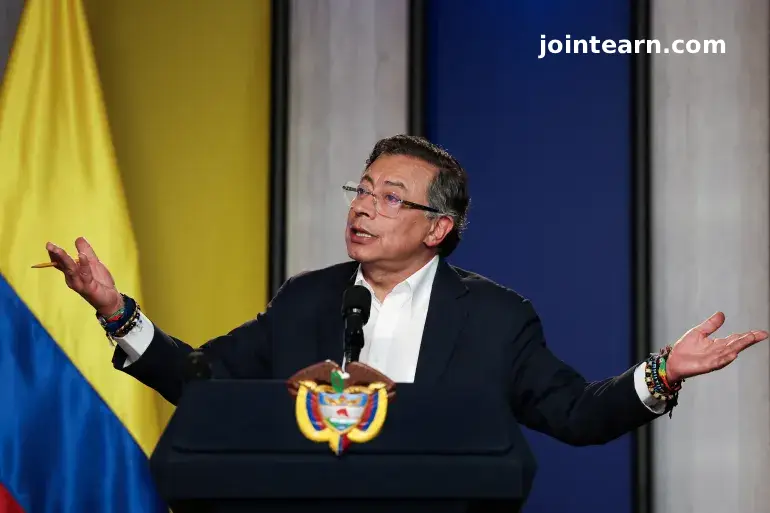
Bogotá, October 23, 2025 — Colombian President Gustavo Petro has dismissed the United States’ threat to suspend financial aid to Colombia, calling the move “nothing,” even as he acknowledged that disruptions to military cooperation could have serious consequences for the country’s security operations.
Speaking at a press conference at the Casa de Nariño presidential palace, Petro struck a defiant tone in response to President Donald Trump’s recent announcement halting all US funding to Colombia and raising the possibility of new trade tariffs.
Petro: US Aid Cuts Would Mean “Nothing”
“What happens if they take away aid? In my opinion, nothing,” Petro said bluntly. “That so-called aid often flows through US agencies and benefits Americans more than Colombians.”
The Colombian leader emphasized that most US assistance never directly reaches the Colombian government but instead circulates within programs managed by USAID and other American contractors. Petro added that Colombia has long depended on its own internal economic reforms, not foreign aid, to drive development.
However, Petro admitted that a loss of military support from Washington could have a tangible impact on Colombia’s ability to manage security threats.
“Now, in military aid, we would have some problems,” he said. “Without access to certain equipment—especially US-supplied helicopters—our logistics and response capacity in remote areas would suffer.”
Tensions Mount Over Drug War and Tariff Threats
Relations between Bogotá and Washington have deteriorated sharply in recent months, as Trump has accused Colombia of failing to curb drug trafficking. Earlier this year, the Trump administration “decertified” Colombia’s anti-narcotics efforts—a move that could justify further funding cuts or sanctions.
On Wednesday, Trump announced that “all funding to Colombia has been halted” and warned that he could soon raise tariffs on Colombian exports. The US president also used inflammatory language, calling Petro an “illegal drug leader” and a “bad guy”—comments that Colombian officials condemned as “offensive and unfounded.”
Petro responded by recalling Colombia’s ambassador to Washington, DC, though he maintained diplomatic contact through a meeting with the US charge d’affaires in Bogotá late Sunday.
Despite the rhetoric, Petro expressed skepticism that Trump would impose tariffs on Colombia’s two most lucrative exports: oil and coal, which together account for roughly 60 percent of the country’s sales to the US.
“He may threaten tariffs,” Petro said, “but oil and coal are essential imports for the US. Those are not easy targets.”
He added that Colombia could offset potential tariff losses by diversifying export markets, particularly in Asia and Europe.
Background: The Collapse of USAID and Ongoing Military Ties
Colombia was once one of the largest recipients of US aid in Latin America, receiving billions under programs like Plan Colombia. However, the flow of money was abruptly disrupted this year after the Trump administration shut down USAID, the US government’s humanitarian assistance arm.
While humanitarian programs have been halted, military cooperation continues, with US forces still stationed in Colombia to share intelligence and support anti-narcotics operations.
Petro cautioned that while financial aid was politically symbolic, the military partnership was strategically vital.
“Those helicopters and that intelligence-sharing have helped in difficult terrain,” Petro said. “Losing that collaboration could set us back in our operations against organized crime.”
Petro Condemns US Strikes in the Caribbean
Tensions between the two leaders also stem from recent US military strikes on alleged drug-smuggling vessels in the Caribbean Sea, operations that have killed dozens. Petro has openly criticized the attacks, calling them violations of international law.
“Missile bombings on unverified targets cannot be justified,” Petro said earlier this week. “We cannot accept extrajudicial killings under the pretext of fighting narcotics.”
Legal experts and human rights groups have echoed his concerns, warning that the US military’s expanding operations in the region risk destabilizing Latin America.
Domestic and Political Implications
Petro suggested that Trump’s aggressive stance toward Colombia may be politically motivated, designed to bolster right-wing forces ahead of Colombia’s 2026 legislative and presidential elections.
“These are not foreign policy decisions—they’re campaign tactics,” Petro said. “He’s trying to strengthen the far right in our country by using fear and intimidation.”
Despite the tensions, Petro vowed to keep Colombia’s sovereignty intact and to pursue a “new era” of diplomacy focused on equality and mutual respect, rather than dependency.
“Our relationship with the United States cannot be one of submission,” he said. “It must be one of dignity and cooperation.”


Leave a Reply